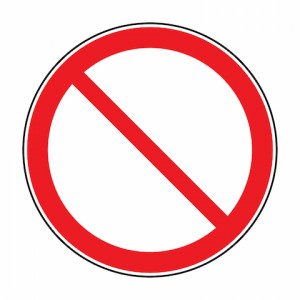In the movie Mr Bean’s Holiday, Mr Bean travels to France but only knows the French word for ‘yes’. His inability to say ‘no’ causes all sorts of mishaps. To make sure that your stay in Korea doesn’t end up like Mr. Bean’s trip to France, make sure you know how to say ‘no’ in Korean!
Like the word ‘yes’, there are ways of saying ‘no’ without using the actual word for ‘no’. Read the bonus section at the end of this article to learn some of these ways of saying ‘no’.
Here we go!
*Can’t read Korean yet? Click here to learn for free in about 60 minutes!
Formal & Standard ‘No’ in Korean
1. 아니요 (a-ni-yo)
This word can be used in both formal and standard Korean. The word can be used by itself.
Some alternate spellings that you might see are 아니오 and 아뇨. These mean the same thing but the correct spelling is 아니요. Therefore, use this spelling when you use the word.
Example:
김치를 좋아해요? (gim-chi-reul joh-a-hae-yo?)
Do you like gimchi?
아니요, 싫어요. (a-ni-yo, shil-eo-yo)
No, I don’t [literally – no, I hate it]
Informal ‘No’ in Korean
1. 아니 (a-ni)
If you want to speak informally, you can drop the 요 from the end of the word. You can use this when speaking to somebody who is very close to you and is of a similar or younger age to you.
Example:
김치를 좋아해? (gim-chi-reul joh-a-hae?)
Do you like gimchi?
아니, 싫어! (a-ni, shil-eo!)
No, I don’t [literally – no, I hate it]
Bonus: ‘It is not’
A word that sounds very similar to 아니요 is the word 아니에요 (a-ni-e-yo). 아니에요 means ‘it is not’, but many people get these two words confused when learning Korean.
The word 아니에요 changes to 아니야 (a-ni-ya) when speaking informally. It changes to 안입니다 (an-im-ni-da) when speaking formally.
Examples:
일본사람입니까? (il-bon-sa-ram-im-ni-kka?)
Are you Japanese?
아니요, 일본사람 안입니다. (a-ni-yo, il-bon-sa-ram an-im-ni-da)
No, I’m not Japanese.
영국사람이에요? (yeong-guk-sa-ram-i-e-yo?)
Are you British?
아니요, 영국사람 아니에요. (a-ni-yo, yeong-guk-sa-ram a-ni-e-yo)
No, I’m not British.
중국사람이야? (jung-guk-sa-ram-i-ya?)
Are you Chinese?
아니, 중국사람 아니야 (a-ni, jung-guk-sa-ram a-ni-ya)
No, I’m not Chinese.
A word of caution about Romanization
We’ve added in the Romanization for all of these words to help with pronunciation. However, we recommend that you try to move onto reading comfortably in Hangul (the Korean alphabet), as this will improve your pronunciation and your reading skills. It will also help you notice patterns in words, which will lead you to improve the rate at which you learn new Korean words and grammar points.
You can download a free guide to learn the Korean alphabet in about an hour here.
Learning vocabulary words is a great way to help you learn the basics of a language, but your language learning will only really take off one you start attempting to have conversations in Korean. Take a look at our free list of Korean phrases or our full Korean course for all the help you will need when studying Korean.
Bonus: Other ways of saying ‘no’ in Korean
By now, you should know how to say ‘no’ in Korean. However, in the Korean language, there are lots of other words and phrases that would be written as ‘no’ if they were translated into English. Below are some of the more common examples. All of the examples are in the standard politeness level.

안돼요 (It isn’t allowed)
맥주를 주세요 (maek-ju-reul ju-se-yo)
Beer please.
안돼요! (an-dwae-yo)
No [literally – it’s not allowed]
못해요 (I can’t do it)
수영할 수 있어요? (su-yeong-hal su iss-eo-yo?)
Can you swim?
못해요 (mot hae-yo)
No [literally – I can’t]
없어요 (It doesn’t exist)
현금이 있어요? (hyeon-geum-i iss-eo-yo?)
Do you have any cash?
없어요 (eops-eo-yo)
No [literally – it doesn’t exist]
Hopefully you now have a better understanding of how to use the word ‘no’ in Korean. Keep listening to how Koreans answer questions negatively to help you understand how to say ‘no’ in different situations.
*Want more Korean phrases? Go to our Korean Phrases Page for a complete list!
 Learn to read Korean and be having simple conversations, taking taxis and ordering in Korean within a week with our FREE Hangeul Hacks series: http://www.90DayKorean.com/learn
Learn to read Korean and be having simple conversations, taking taxis and ordering in Korean within a week with our FREE Hangeul Hacks series: http://www.90DayKorean.com/learn
Korean lessons * Korean Phrases * Korean Vocabulary * Learn Korean * Learn Korean alphabet * Learn Korean fast * Motivation * Study Korean


Recent comments